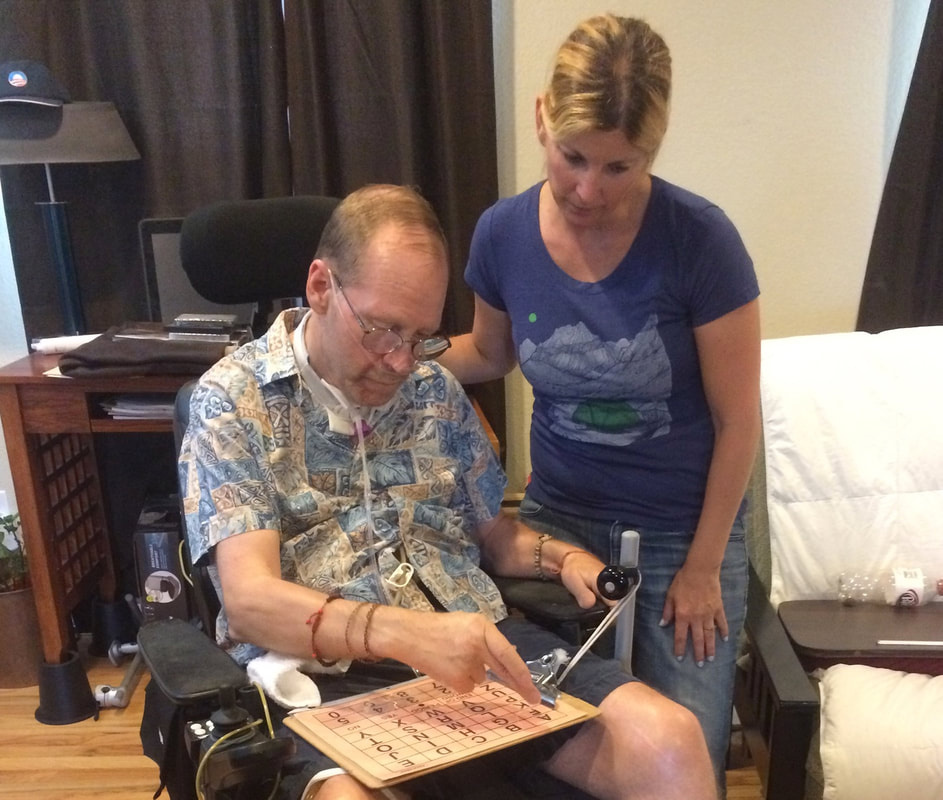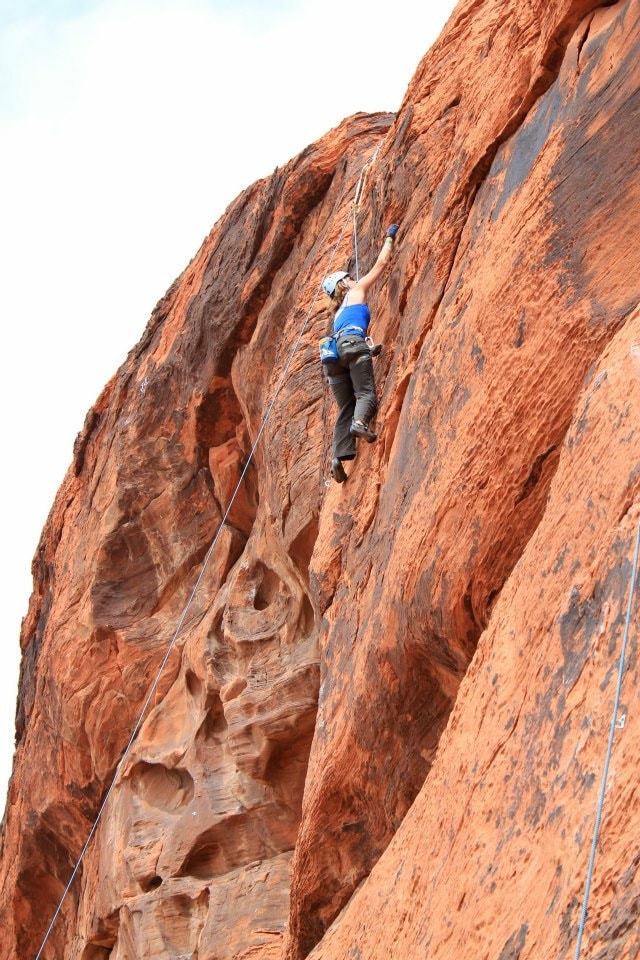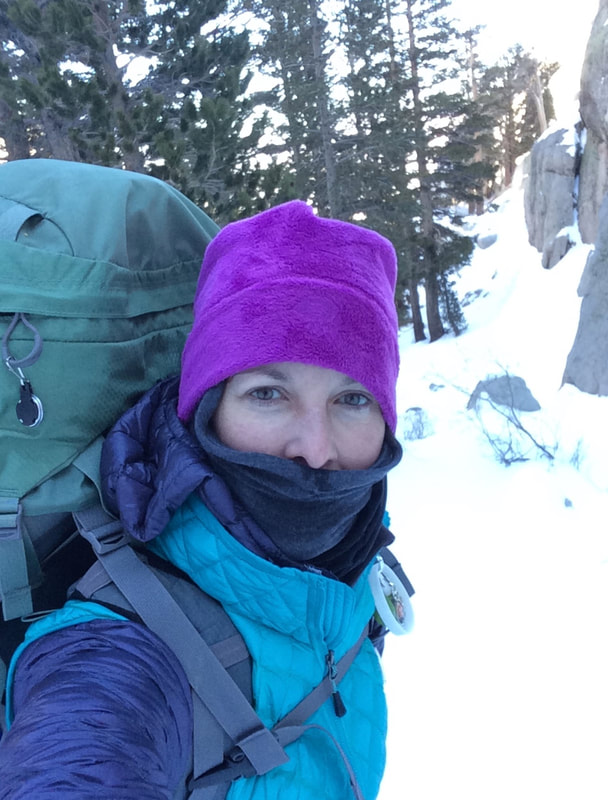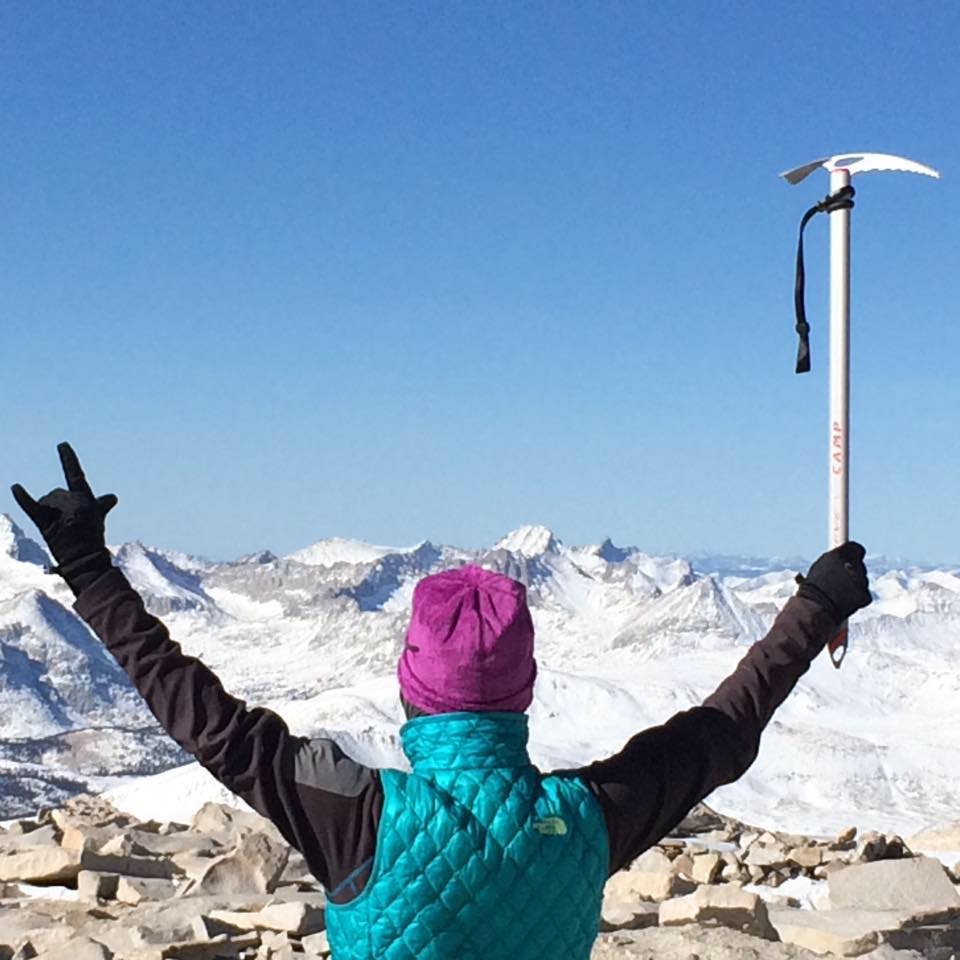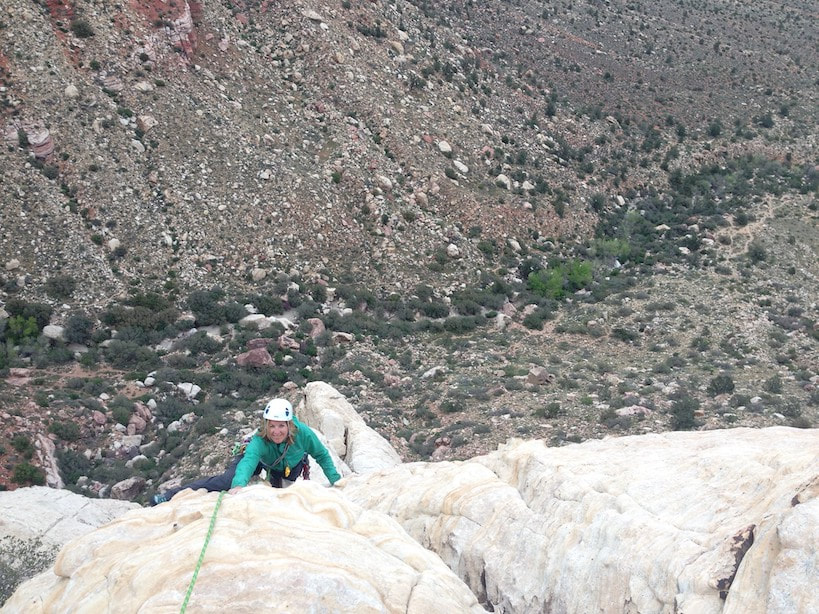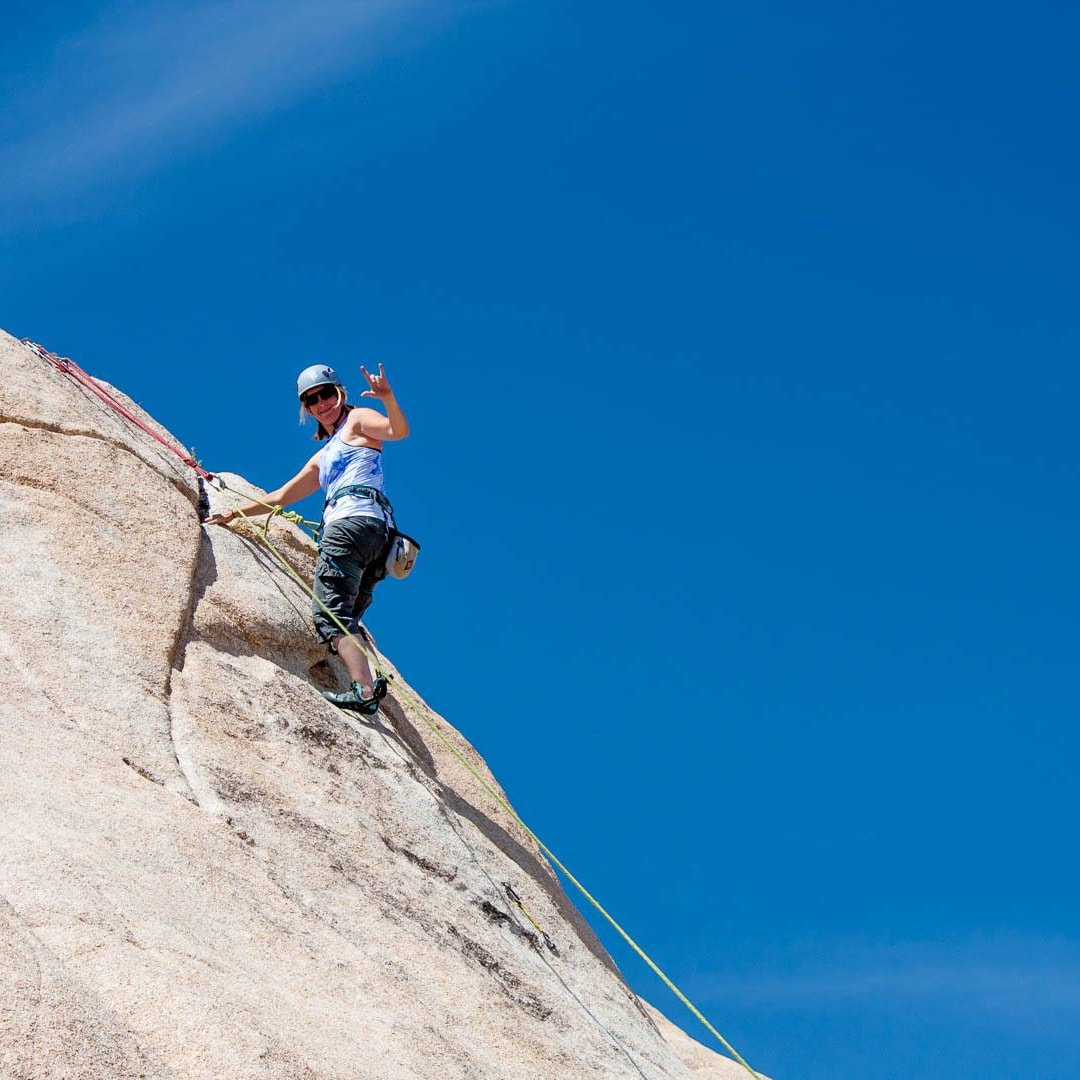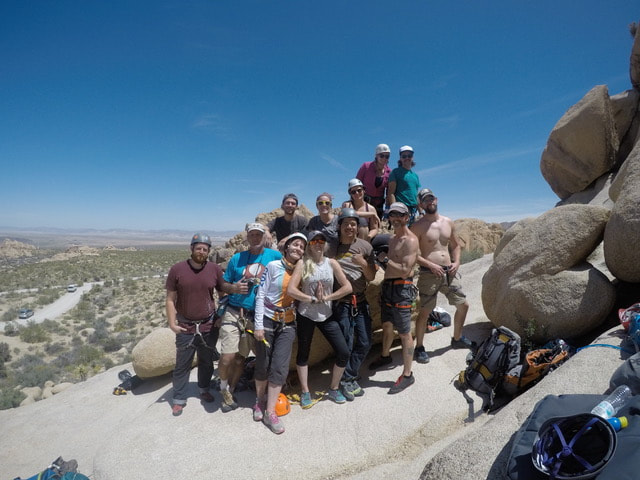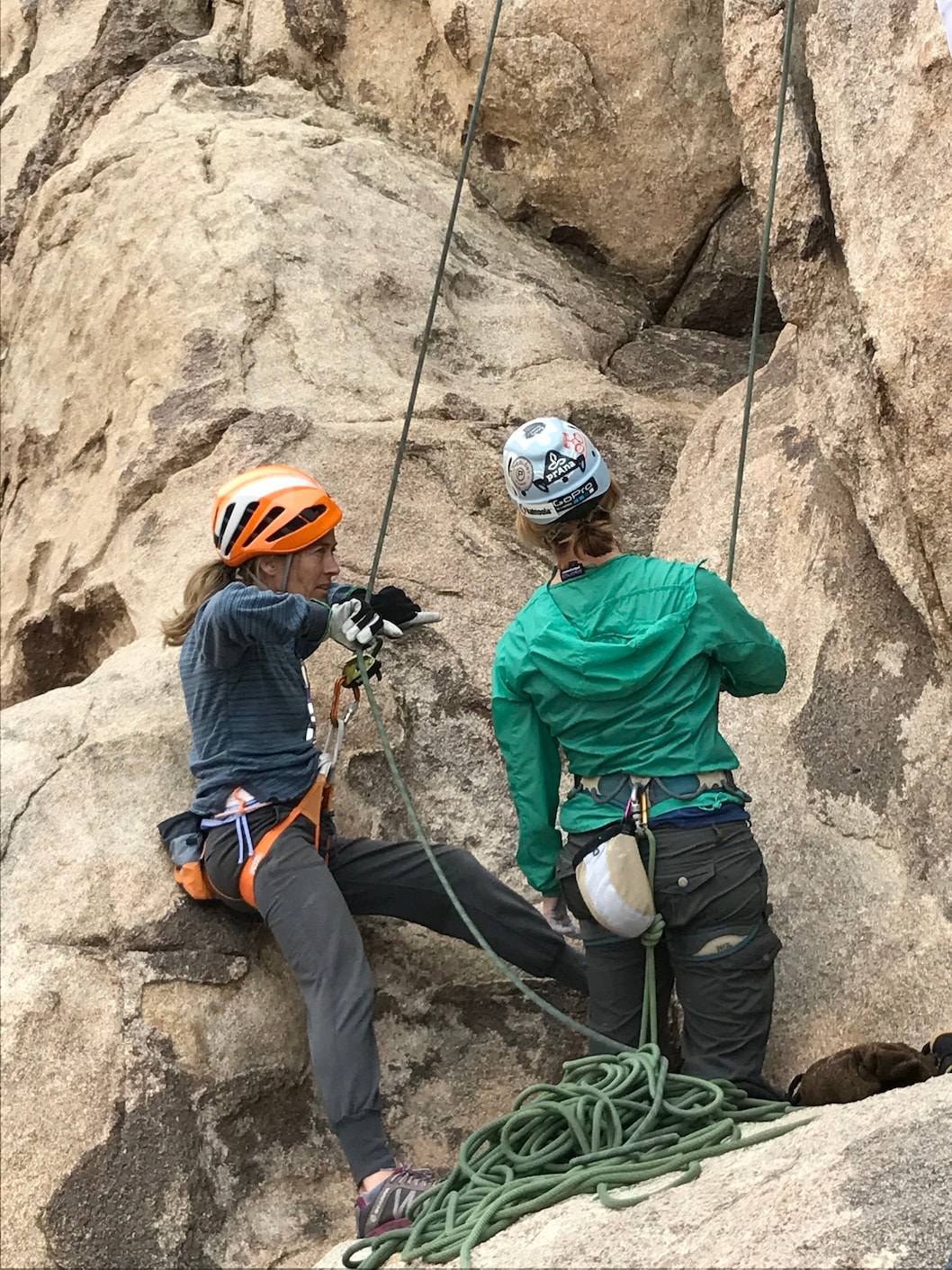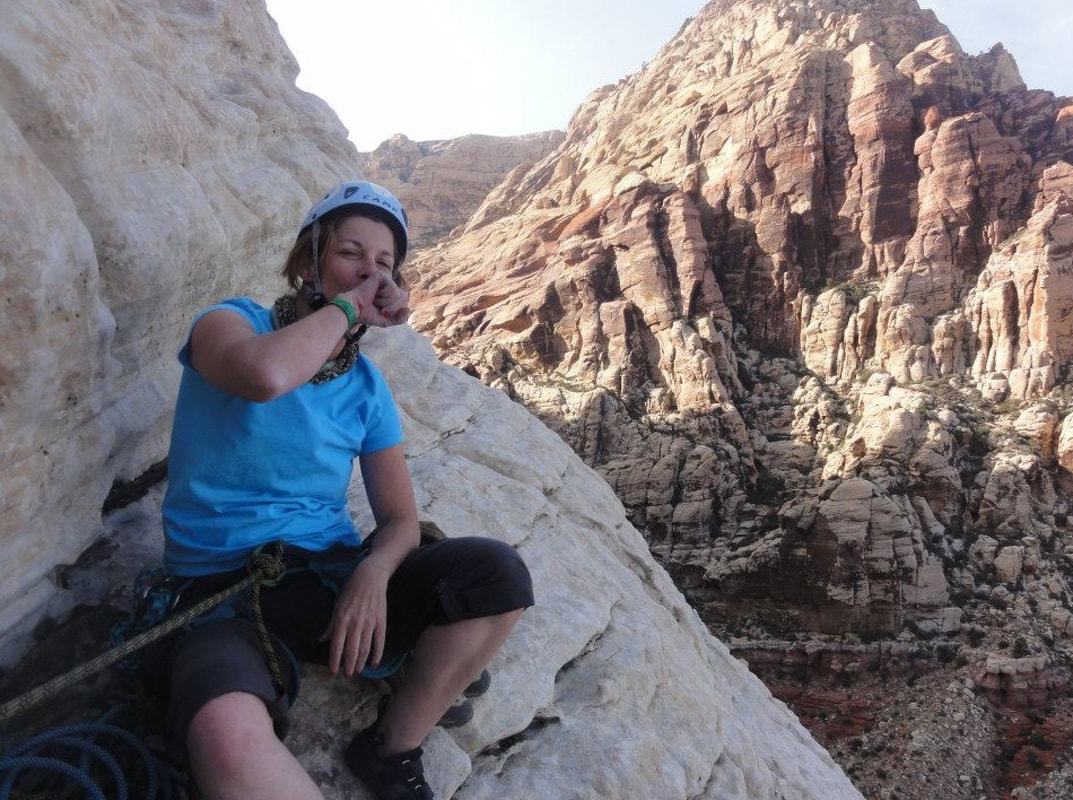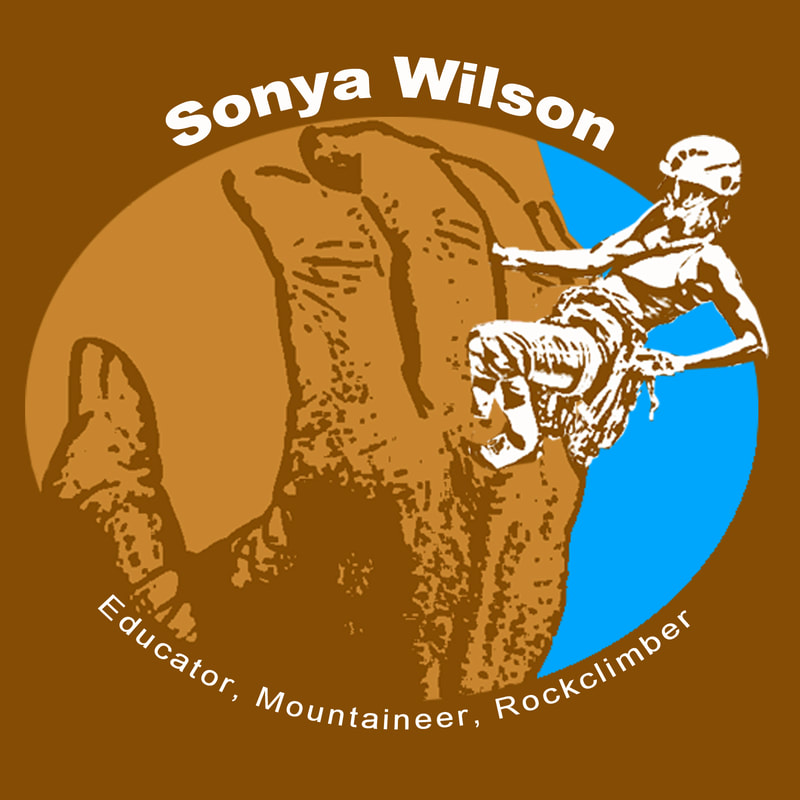|
Ever since I can remember I have had a deep passion for the outdoors and adventures.
My name is Sonya Wilson, while I am native Californian, my heart is also in Nevada where my passion for outdoors and climbing began at a young age. I grew up in Nevada the first half of my childhood and then in California the second half - all the way until now. I have worked over 20 years in the education field teaching American Sign Language (ASL) and Fine Arts in various settings: high school, as a college professor, adult education, as an ASL consultant, workshop designer, and presenter for various entertainment industry clients such as Dreamworks, Mark Taper theater, Cricket Feet and more. I have a deep love for hiking, mountaineering and rock climbing. In the 90s, I started spreading my wings further in the outdoors and exploring my local mountains. I frequented California and Nevada mountains as a solo adventurer with my certified service dog Taz. We had many fun adventures and I evolved further as an Deaf Outdoor Adventurer. |
In 2012, I founded the ASL Climbing Network on Facebook for my local area of Los Angeles. Now, it is a hub for those who want to connect with other Deaf climbers, climbers who sign, and those who don’t know sign language but want to learn.
The best way to connect with each other and nature is in the outdoors. ASL Climb frequently hosts outdoor and indoor ASL climbing days in the LA area and ASL Climbing weekends in various locations such as Joshua Tree, Malibu Creek, Red Rock Canyon, and other locations.
The best way to connect with each other and nature is in the outdoors. ASL Climb frequently hosts outdoor and indoor ASL climbing days in the LA area and ASL Climbing weekends in various locations such as Joshua Tree, Malibu Creek, Red Rock Canyon, and other locations.
|
In 2012-2018, I collaborated with Mountain Gear for the Red Rock Rendevous annual event (ed note: 2019 was the last year for The Red Rock Rendevouz) to include fellow Deaf climbers/Adventures. I recruited skilled ASL interpreters , which I refer to as Outdoor Adventure Interpreters (OAI). This was a opportunity to advocate to include Deaf in the outdoors and educate and connect with each other.
To this day, I continue to find ways to tie the Deaf community and outdoors as well as advocate for the outdoor industry to be truly inclusive and accessible to Deaf adventurers like myself. I was born in Los Angeles CA and in my toddler years my mother and I moved to Las Vegas, Nevada where I attended a Deaf and Hard-of-Hearing (DHH) program. My fellow Deaf classmates were my family and we had the best times signing and expressing ourselves hidden away from those who did not support ASL or nor view us as normal, which we were. We created that space needed to be ourselves on the playground and in the desert. I was often the one getting in trouble as I was caught climbing the fence to escape and throwing away the “amplified hearing device” box that was strapped to my chest and molded to my ears with ear-molds. It was so uncomfortable that my friends and I would break them or throw them in the toilet. We preferred to be our natural selves. The desert and Red Rock Canyon was where we sneaked off, as it was the best place to connect, feel safe and accepted. Oh the signing stories we shared and the exploring nature together! |
From a young age, I was told I was always climbing things - from getting out of the crib, the stair railings, on top of cars. Then at 5 years old I graduated to climbing the roof of our house to escape a troubled childhood. I was fearlessly and constantly climbing trees, monkey bars, and fences. I often watched from afar other people climbing the big rocks and walls using ropes - it was fascinating.
My friends and I were also always riding our bikes out the most magnificent place known as the Red Rock Canyon to explore.
I gained life lessons from the outdoors, as it accepted me unconditionally.
My friends and I were also always riding our bikes out the most magnificent place known as the Red Rock Canyon to explore.
I gained life lessons from the outdoors, as it accepted me unconditionally.
|
As a child I was often with my grandmother, who owned a horse ranch, and she showed me the ways of the ranch and taught me invaluable skills. She noticed I had a gift for being very attentive to body language, expressions and connected easily with animals, painting/drawing, and nature.
She was an old school "cow-gal" who showed me how to survive, as she knew my home life was tough. My mother did not communicate with me except with her angry eyes. It was very hard for her to accept that she had a beautiful perfect child who was deaf. From my grandmother, I learned how to climb haystacks to help feed the horses. I was a wild child and she knew it. Life changed at 11 years old, my mother passed away. I left Las Vegas to life with in California with my aunt, uncle and their children. It was a big adjustment for us all. My family did a great job raising me and giving me a chance to learn many things I was not given before. My favorite areas have always been Yosemite, Joshua Tree and Red Rocks. All these things contributed to my life-long passion for the outdoors and all the gifts it holds for everyone. |
You established the American Sign Language (ASL) Climbing Network. Tell us about the ASL Climbing Network – what is it and what does it do?
I established the ASL Climbing Network to provide a space for others to connect, meet and adventure in the outdoors. Everyday there are more and more Outdoor Deaf Role Models.
Members of this group find partners for outdoor activities where most everyone is learning ASL or are fluent signers. This network brings three communities together: Outdoors, Deaf and hearing.
Having hearing people join are opportunities to educate, empower, learn together and dispel stereotypes and myths that people often have about Deaf.
This resource is also a space where others share news, connections, support, events, and encouragement. We also host ASL Climbing days and weekends conducted in ASL (interpreters for hearing people provided when needed) in Los Angeles, Nevada, and other various locations.
Collaboration and allyship are important when the goal is for everyone to have successful experiences. Being aware and an ally for a community other than your own is when progressiveness happens.
When I was a little girl, I wanted to meet other Deaf outdoor explorers, but I didn’t see any at that time in my area. I knew they were out there, so by creating the ASL Climbing Network the hope is to provide a space for others to connect, meet and adventure the outdoors.
Diversity and inclusiveness should be valued and celebrated which means including Deaf people. Connecting with the Outdoor Deaf community would help the Outdoor industry to learn more about what true diversity, inclusiveness, access and communication really means and how to put the changes in action. Remember Actions are “louder” than words.
I established the ASL Climbing Network to provide a space for others to connect, meet and adventure in the outdoors. Everyday there are more and more Outdoor Deaf Role Models.
Members of this group find partners for outdoor activities where most everyone is learning ASL or are fluent signers. This network brings three communities together: Outdoors, Deaf and hearing.
Having hearing people join are opportunities to educate, empower, learn together and dispel stereotypes and myths that people often have about Deaf.
This resource is also a space where others share news, connections, support, events, and encouragement. We also host ASL Climbing days and weekends conducted in ASL (interpreters for hearing people provided when needed) in Los Angeles, Nevada, and other various locations.
Collaboration and allyship are important when the goal is for everyone to have successful experiences. Being aware and an ally for a community other than your own is when progressiveness happens.
When I was a little girl, I wanted to meet other Deaf outdoor explorers, but I didn’t see any at that time in my area. I knew they were out there, so by creating the ASL Climbing Network the hope is to provide a space for others to connect, meet and adventure the outdoors.
Diversity and inclusiveness should be valued and celebrated which means including Deaf people. Connecting with the Outdoor Deaf community would help the Outdoor industry to learn more about what true diversity, inclusiveness, access and communication really means and how to put the changes in action. Remember Actions are “louder” than words.
Can you describe specific challenges Deaf rock climbers and alpinists experience?
Often I was the only deaf person in a climbing group, which I am ok with as long as I am given the access I request. This often does not happen, as I have experienced. I have wondered if there were more than one deaf person in a group, would the outdoor education school or guide company give the access requested? Would we always have to standup for ourselves to push for better access and break down people’s fears?
I used to think the outdoors was my biggest challenges, but, no, its other people. Let each person or group tell you what they need, not the other way around.
As per Miriam Richards, a fellow Deaf climber, says: “My experience to work with international guide companies have been smooth and accessible as they have experience with foreign climbers. Ironically, American guides have issues with Deaf because of fear, assumptions and stereotypes. With awareness hopefully American guides will become more accepting and work with us more often. Deaf climbers have the same mind, heart, spirit and passion.”
Climbing requires intense observation proficiency which is natural for many Deaf people. Miriam and I have both experienced trying to hire a guide for a mountain expedition and were often denied. Even one company told me I must hire three hearing guides per Deaf. This is oppressive, unrealistic and unnecessary and extreme over-reactive.
In another experience, Miriam and I were trying to join a climbing group to climb all seven of the highest world summits. We were told we had to hire the interpreters privately and they would charge us a lot more. Even when we said we were both experienced climbers and both teachers and we could show them how to work with us in a group, they still refused. Don’t charge us more just because we are deaf or don't expect us to carry the entire cost of interpreters. This makes it next to impossible for us to afford the adventure. Look at us as resources.
One thing I'd like to share from those experiences is I'd like guides to know that interpreters are good for instructional teaching, orientation and when practicing skills. But when climbing a mountain you don’t need to communicate much except for whatever visual communication strategies you choose to use. Often you are too busy focusing on the act of climbing to communicate much at all.
It is important to allow Deaf people to show guides and outdoor companies alternate communication. Deaf people are equally capable of doing anything on the mountain as others. Being Deaf actually enhances my ability as a climber and outdoors adventurer since I have to focus and am not easily distracted.
We have strength in the eyes and understand body language and expressions very well. We are able to naturally adapt and hone in on what we feel and see. Our adaptability skills are often off the charts. When you are faced with challenges in life and on the mountain or on the rock, your adaptability skills evolve, improvise, and are enhanced and heightened.
In climbing situations: I work out in advance with my climbing partners what hand-signals, gestures, or ASL signs to use. It keeps everyone on same page when it comes to using alternate communication methods - whatever works for individuals to understand each other and stay safe.
Doing this makes me a better climber as I am constantly focused on communication. I have had experiences both on the rock and mountains where people assume because I am Deaf that I am unsafe partner. That assumption couldn’t be further from the truth. Just climb with a Deaf person and you will find out.
With multipitch climbing there have been attempts at developing a rope tugging system for communication when conditions do not allow climbers to hear each other (unless of course you have a walkie talkie, which is the best tool for multipitch climbing for those with some hearing.) There are some serious limitations to the rope tug system because there are so many conditions that can mimic a tug or the terrain (rope drag) can limit the obviousness of tugs. Tell us about the ways you have experimented with communication systems – what has worked and what doesn’t? (Are there any walkie talkie type devices that can vibrate, flash lights, or send short text messages between each other?)
I completely agree with your statement about rope tugging systems. Rope tugging systems are not always reliable due to conditions like winds, lag, potential rock fall, and high potential for miscommunications. But if you need to rely on a rope tug system use it as backup. Best to not rely on this if at all possible. Use it if you must for the moment but be very sure it is clear communication.
The lead must guide the rope in clear areas void of potential rope snags and cause loose rocks which could potentially hurt someone below including your belayer. A long time ago, I did experiments to test out the method with the rope tug but found it to be unreliable and more stressful as there were some close calls of misunderstandings.
In 2016, I had the privilege to meet and visit Jeff Lowe and his partner Connie Self. In sharing our adventures and climbing talks, I told him (via my ASL interpreter) about my challenges with rope tugs in the past and that I had devised a visual communication strategy with my Deaf climbing group in Los Angeles. He shared with me (via an ABC board) that he made-up a small rope tugging strategy, but agreed it was best to not to rely on rope tugs as there was too much room for error.
He mentioned it’s ok for indoor climbing gyms or if a outdoor route is completely void of any potential dangers and no wind. Just continue using the Visual Communication System for Climbing that my local Deaf Climbing group created.
Keep your communication on the wall to a minimal, clear and to the point. There are many different visual/alternative communication strategies for activities or jobs have been around for eons. It is not new but I am sharing it because it is important and it needs to be discussed more often. Deaf people are natural visual communicators, so of course everyone has their own system to communicate in the mountain sports.
For multi-pitch climbing, my partner and I review the hand-signals we would use while climbing in eye view (if there is a ledge, we stay near the ledge to see). Deaf climbers rely heavily on eye contact, body movements and even feet taps to communicate. Just improvise and decide whatever works best for you and your team and make sure everyone is on the same page. Being flexible and having the ability to improvise are good skills to have in climbing and communication.
Deaf people have a heightened ability to be attentive to the environment, focused on climbers body language and in the event that teams lose sight of each other the belayer has to “read” the rope by feel and see if it is tight or not before climbing. I prefer shorter pitches or staying within eye view as long as possible. But when we can't see each other, I keep the leader on belay while they are pulling up the rope. Once I feel the rope tight for 10-15 seconds, then I climb.
I love your ideas of a creative innovative walkie talkie with vibrate and light! Brilliant! I think with how fast technology is growing and evolving, someone should be able to create something that would benefit all climbers. It can’t be that hard to make. Maybe like a wrist band with colors, vibrations, pre-texted one word responses (you don’t want a conversation”). Or, maybe a pre-selected gif picture and sound all together meaning something different - like an Apple watch concept. Must be It must be light, weatherproof and durable.
It is always good to have an alternative way to communicate, though - radios walkie talkies batteries die, technology breaks, or can fall unless securely attached to the climber.
These links below are helpful for multi-pitch climbing with Deaf or using non-verbal strategies. From these teams can modify, adjust or add-on as needed:
- Climbing with Hearing Loss: Tips and Tricks: https://www.potomacmountainclub.org/page-1572370
- Effective Multipitch Communication: https://www.climbing.com/skills/learn-this-effective-multipitch-communication/
- Silent Mountain, Roaring Road: Confessions and Lessons of a Deaf Climber and her Motorcycle: https://deafclimber.blogspot.com/2015/06/multi-pitch-communication-with-deaf.html
- 2017 AAC Publication: Climber Communication https://americanalpineclub.org/resources-blog/2017/1/19/4xm1fcsag6b7xqf1p1w1qp7vdpp1ha
What resources are out there for Deaf climbers and what would you like to see more of? (Paradox sports is known for supporting adaptive climbing, is Deafness and climbing something they are also supporting? If so, how? If not, what would you like to see?)
In my own experiences, REI provided ASL interpreters for the workshops and outdoor events that I took in 2011-12. It was a great experience as REI just asked me directly, "What did I need? and "What interpreter did I feel comfortable with?" It was awesome! I was thrilled hat I did not have to advocate for myself much.
I think part of the reason it worked so well with REI is because I made a point to build connection and make myself known at my local REI store. Sometimes you just find the right person who is receptive to my needs without any issue. It was a great experience for me.
The National Outdoor Leadership School (NOLS) has also been very supportive of Deaf folks who train with them and take classes. It was smooth and easy to communicate with NOLS when I was sharing what kind of access I would need and they were very receptive. I wish all companies were like them.
Paradox is amazing and they do support deaf climbers which is evident in their published manual, “Adaptive Climbing Manual” 2015, which includes information about Deaf climbers. For example, it includes the “Marhold Tug system” created by Trenton March and Buckyhold - two Deaf climbers. For this system, the climbing teams have to really know each other well and practice for it to be effective. It works well for some teams and may not work for others. The chapter includes other strategies for adaptive communication methods and Deaf climbing stories. Not all methods work for each person so you have to find what is the best strategies for you and your team (see my comments about communication above.)
Things would I love to see...
Outdoor films, documentaries, video content creators --Caption your work, not only with words but surrounding environmental sounds included too! Any outdoor film festivals and online outdoor videos should be captioned.
I cannot tell you how many times I was disappointed and had to leave an event because the film wasn’t captioned. The outdoor industry is promoting diversity and inclusion more, yet they seem to forget Deaf people. It upsets me when I see people or companies claim inclusion, yet they don’t caption their video content. Please caption your videos online (with on or off option and include environmental sounds in the captions) and at film festivals and outdoor movie showings. Have some procedures in place in case that type of access is requested. Often I have to just wait for films to come on Netflix, but I want to participate in these events!
A wonderful example I'd like to share is when Michael Brown, the owner of Serac Adventure Films, produced a documentary that I wanted to see, but it did not have captions. I emailed him and I introduced myself and explained how closed caption helps not only Deafs but everyone. It benefits more people from all communities such as those learning English, helps those who process content better from reading it, the elderly folks, etc.
He and his team got right to it and added captions for me and my friends to watch at home. Ever since then we have been friends and I greatly appreciate his ability to recognize that access is important for all people. He truly cares about all communities and making sure that everyone can enjoy his films. I have the utmost respect for him and he sets a great example of inclusive filmmaker for others to follow. In fact, Michael recently told me about a new video captioning app called Actiview, which I am checking out.
Whenever my climbing community and I want to see a movie shown at a climb gym we ask is it captioned. Most of the time it isn’t, although a couple of companies have added captions: Outdoor Research and REI. I have told them how much I have appreciated this access.
Another important community to support is the DeafBlind folks. It is important to include captions and transcription that can be easily found. Providing this access benefits many people not just deaf but also late-deafened, English learners, older folks and basically anyone! A great resource to contact is company named Deaffriendly (http://www.deaffriendly.com) business founded by Eco Greenlee. They are wonderful in guiding companies to becoming more accessible.
It would benefit adventure guides to be exposed to various alternate communication strategies, visual expressions, hand-signals/signs, how to improvise and gain adaptability skills when it comes to providing communicational access and inclusiveness.
Provide soon-to-be-guides different hypothetical situations that do not rely on voice or ears. There are natural situations where hearing people may not hear each other (crevasses, wind, distance, long rope team, a busy climbing wall when it is crowded, etc.) and being able to tap into this ability quickly, makes you a more inclusive and prepared guide.
These types of classes should be taught by outdoor Deaf people who are natural at visual expressions and communication. It would greatly benefit guides and their clients. Make decisions together based on skill and ability. We all learn from each other and work together, that is team work.
I'd love to see more guide companies/organizations like the Mazamas where they will provide ASL interpreters when requested (per fellow Deaf Mountaineer/adventurer Linke Rejholec who is currently in training with them and loves it!)
Another thing I would like guides to know is not all Deaf people need or want an interpreter. It is not always necessary as not all deaf people know ASL. It is not hard to communicate with a Deaf person, just be willing to learn. Should a Deaf person join a group and want access that might include an interpreter (or not). One to two interpreters is common but again always ask the Deaf/Hoh/DeafBlind person directly what you can do to work with them. Just ask what Deaf climber’s preference when it comes to access and communication. Let them guide you, not the other way around, when it comes to a person’s needs. If there is a group mixed of Deaf and hearing climbers then two interpreters is enough - if that is their preference.
Climbing Gyms
As Climbing gyms become more popular, it is important for more gyms to be inclusive and accessible for all including Deaf/Hard of Hearing people.
Technology
Innovative Outdoor Technology, mountain safety equipment and communication technology to be more versatile.
Outdoor Adventure Programs for Deaf Children
Collaboration between the outdoor industry and Outdoor Deaf Community
General
“Don’t make decisions about us without us.”
Are there any special events specifically for Deaf climbers and climbers hard of hearing?
Various Deaf climbing groups will host events in their local area. There are monthly ASL Climbing Days at local climbing gyms or outdoors. We sometimes collaborate with Southern California Mountaineers Association to provide climbing clinics for 2 days of climbing and camping with ASL interpreters. More and more Deafs are getting involved and challenging the outdoor industry to become more accessible and truly inclusive.
Recently there have been a few REI classes being taught by Deaf. I am sure there are events being hosted by climbers in local areas. I would love to see more Deaf Climbing events all over the nation and world for that matter.
Various Deaf climbing groups will host events in their local area. There are monthly ASL Climbing Days at local climbing gyms or outdoors. We sometimes collaborate with Southern California Mountaineers Association to provide climbing clinics for 2 days of climbing and camping with ASL interpreters. More and more Deafs are getting involved and challenging the outdoor industry to become more accessible and truly inclusive.
Recently there have been a few REI classes being taught by Deaf. I am sure there are events being hosted by climbers in local areas. I would love to see more Deaf Climbing events all over the nation and world for that matter.
Do you focus primarily on Deaf climbers or do you also work with those with impaired hearing? (Feel free to educate us on these differences)
We focus in everyone! Hearing impaired it not a label that is used in the community as it is a negative and often offensive label. Hard of hearing or Deaf is appropriate and respectful. Capital D in Deaf means someone who embraces their identity and being Deaf is not a medical issue but a gift - it's a different sense. Impaired means broken. It is important to reframe that thinking and learn how being blessed Deaf is awesome! It's important to focus on our strengths and talents.
Also, many may not realize that the word Deaf encompasses a wide range of "hearing." The Deaf community is made up of many different people and diversity. Ranging from Deaf, hard of hearing, late-deafened, those who have cochlear implants, hearing aids. All one big family.
We include Deaf, hard of hearing and people with hearing - all to come, learn and have a blast. Everything is conducted in ASL and visual demonstrations, but when needed interpreters who also climb are often present.
Each person identifies themselves however they feel most comfortable. Each Deaf person is unique: some may choose to wear hearing aids, some have cochlear implants, some are late deafened, some lip read, some are Deaf-blind, etc. Communication preferences can vary.
What should people with hearing know about climbing with a Deaf climber?
Several things:
- Climbing and mountaineering are very visual and communication is so essential and Deaf are quite adept at these things. As a result, Deaf and hard-of-hearing is NOT safety concern. I just continue to emphasize that it is important to communicate with your partner before climbing to decide on adaptations to ensure clear and effective communication. This “rule" has been around since the beginning of it all so it is not a new idea but are we doing it.
- You do not need to know ASL to be able to connect. Do not be afraid to ask questions. The best way to learn is by interacting with Deaf, learning about the community - which are same as any other community.
- Once people adventure or climb with Deaf they realize the hardest part is letting go of their own assumptions. Often folks will make assumptions about Deaf/Hard of Hearing people without interacting with us. The best way to get the facts is by interacting directly with Deaf adventurers. Ask your Deaf partner to show you the best ways to communicate. What works for one climber may not work for another but that is where you expand, improvise and be flexible. There is always more than one way to accomplish the same outcome. How you both will communicate will depend on what kind of modifications you need to make for a specific climb. Be ready to improvise when or if it is needed.
- I just want to encourage both Deaf and hearing folks to get involved. On the wall there’s really no barriers. Just make sure you and your belayer know how to communicate effectively and keep it simple.
Nature itself doesn’t rely on what you can or can’t hear.
What are your personal goals with respect to climbing and advancing climbing for those who are Deaf?
For myself, I will continue to enjoy climbing, mountaineering and explore new locations. I hope to climb all 50 US high points and travel to other countries to explore and discover more adventures. Anywhere I go I must climb, meet the local Deaf community, meet animals, see the arts and drink coffee. My hope is to one day own my own rock climbing gym and create a program for Deaf kids. It is important to encourage kids to find the joy of the outdoors and climbing that I found when I was their age. I visited a gym in Boulder, Colorado, called ABC Kids Climbing, that really inspired me.
For others, I will continue to do my part to support and contribute to the growing Deaf Outdoor community, host more outdoor events, continue to support my online social media groups and keep advocating and educate for more access, equality and inclusion in the outdoor industry.
Are there other Deaf climbers and leaders in this movement we should know about?
Deaf people have always enjoyed outdoors, but with social media and climbing gyms becoming popular, we are seeing opportunities for people to meet others who sign and climb or want to learn.
Everyday the Deaf outdoor community grows as each person encourages others to enjoy outdoor adventures and recreational activities. There are a growing number of wonderful resources and outdoor groups that many Deaf and the hearing alike can learn and benefit from.
All over the world, in the outdoor industry there are many Deaf rock climbers, mountaineers, alpinists, National Park Rangers, employees at outdoor stores, canyoneering, backpackers, Thru-hikers and the list goes on.
Just to name a few:
Facebook and Instagram Resources
Deaf people have always enjoyed outdoors, but with social media and climbing gyms becoming popular, we are seeing opportunities for people to meet others who sign and climb or want to learn.
Everyday the Deaf outdoor community grows as each person encourages others to enjoy outdoor adventures and recreational activities. There are a growing number of wonderful resources and outdoor groups that many Deaf and the hearing alike can learn and benefit from.
All over the world, in the outdoor industry there are many Deaf rock climbers, mountaineers, alpinists, National Park Rangers, employees at outdoor stores, canyoneering, backpackers, Thru-hikers and the list goes on.
Just to name a few:
- Andre Hedger (UK-Using British Sign Language - Video interview)
- Miriam Richards (Alpinist )
- Heidi Zimmer (Heidizimmer.com & YouTube Video)
- Jeanette Scheppach
- James Wade: Instragram @silent.nomad.hiker
- Karen Erickson
- Richard Lin
- Maleni Chaitoo (New York City)
- Ryan Lane: Instagram @Ryanlane_official
- Linke Rejholec: Instagram @linkesadventure
- Dana Zeiggin (Pennsylvania)
- Georgia Pilkington (England)
- Ricky Ellis (Australia)
- Christina Cox
- Diedre Tanenberg (FB-OptOutside REI Classes in ASL & REI’s 1st Deaf Outdoor School instructor)
- Trenton Marsh (Marhold Tug)
- Justin “Bucky” Buckhold (Marhold Tug)
- Derek Braun
- Brandon Kenny
Facebook and Instagram Resources
- ASL Climbing Network
- Deaf Rock Climbing
- Climb Deaf DC
- Colorado ASL Climb
- Climb Deaf Rochy
- Milton Keynes Deaf Climbing
- Oregon Adaptive Sports
Is there anything else you believe readers should know to help advance their knowledge on this topic?
The outdoors is the ultimate teacher. What I learn from my adventures in the outdoors, I use in my classroom and vice versa. I am a teacher (guide) and I learn from my students all the time just as they learn from me.
To make sure I am supporting my students, who are diverse learners, I use different strategies, provide a space for my students of all types of learners, and talents to be successful. My teaching philosophy is very student-centric. The goal is to see what is working and what I need to change in order to provide the support, access needed.
For me I can see a strong parallel between the outdoors and being a teacher. A teacher is a guide too, just a different kind. A mountain guide or rock climbing guide are “teachers” as well and they can adopt diverse instructional and interaction strategies.
I have lost opportunities because of other peoples fears of me as a deaf adventurer and woman. I want to see the next deaf generation of outdoor adventurers to have the access and inclusiveness without misconceptions, judgments and fears from others. While the struggle is real at times, I have also had some wonderful opportunities/experiences and met some the most amazing people in this industry. Slowly but surely the connections are being made.
The outdoors/Mother Earth wants us to celebrate and uplift each other. The outdoors is for all people, all beings, all experiences and all stories to be shared. Together we all pave and pioneer paths.
The outdoors is the ultimate teacher. What I learn from my adventures in the outdoors, I use in my classroom and vice versa. I am a teacher (guide) and I learn from my students all the time just as they learn from me.
To make sure I am supporting my students, who are diverse learners, I use different strategies, provide a space for my students of all types of learners, and talents to be successful. My teaching philosophy is very student-centric. The goal is to see what is working and what I need to change in order to provide the support, access needed.
For me I can see a strong parallel between the outdoors and being a teacher. A teacher is a guide too, just a different kind. A mountain guide or rock climbing guide are “teachers” as well and they can adopt diverse instructional and interaction strategies.
I have lost opportunities because of other peoples fears of me as a deaf adventurer and woman. I want to see the next deaf generation of outdoor adventurers to have the access and inclusiveness without misconceptions, judgments and fears from others. While the struggle is real at times, I have also had some wonderful opportunities/experiences and met some the most amazing people in this industry. Slowly but surely the connections are being made.
The outdoors/Mother Earth wants us to celebrate and uplift each other. The outdoors is for all people, all beings, all experiences and all stories to be shared. Together we all pave and pioneer paths.
A fun video: The Lynne Hill Experience (2016) - A video featuring Lynn Hill, a gang of legendary JTree climbers, and Sonya Wilson...
We are all human, have minds, hearts, spirit, body – the same as everyone else."

